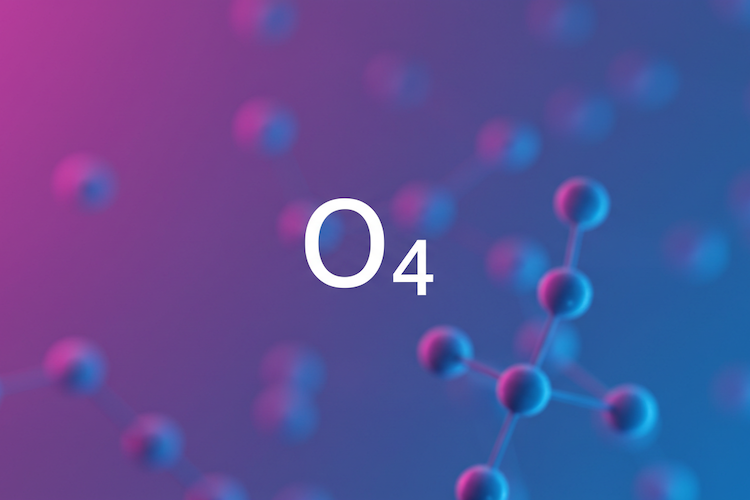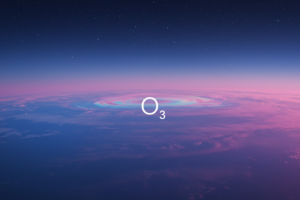Image above generated by AI for this analysis (Imagen 3-002)1Image generated in a few seconds, on 22 December 2024, via Imagen 3-002, text prompt by Alan D. Thompson, ‘a zoomed out background header of tetraoxide, with lowercase title ‘o4’.’
Alan’s work guides official AI docs for the G7, DOE, Microsoft, Apple, & MIT...†Get The Memo.
Alan D. Thompson
April 2025
Summary
| Organization | OpenAI |
| Model name | o4 (OpenAI model number four) |
| Internal/project name | – |
| Model type | Multimodal |
| Parameter count | See below: Size estimate |
| Dataset size (tokens) | See report: What’s in GPT-5? |
| Training data end date | Nov/2024 (est) |
| Training start date | Jan/2025 (est) |
| Training end/convergence date | Mar/2025 (est) |
| Training time (total) | –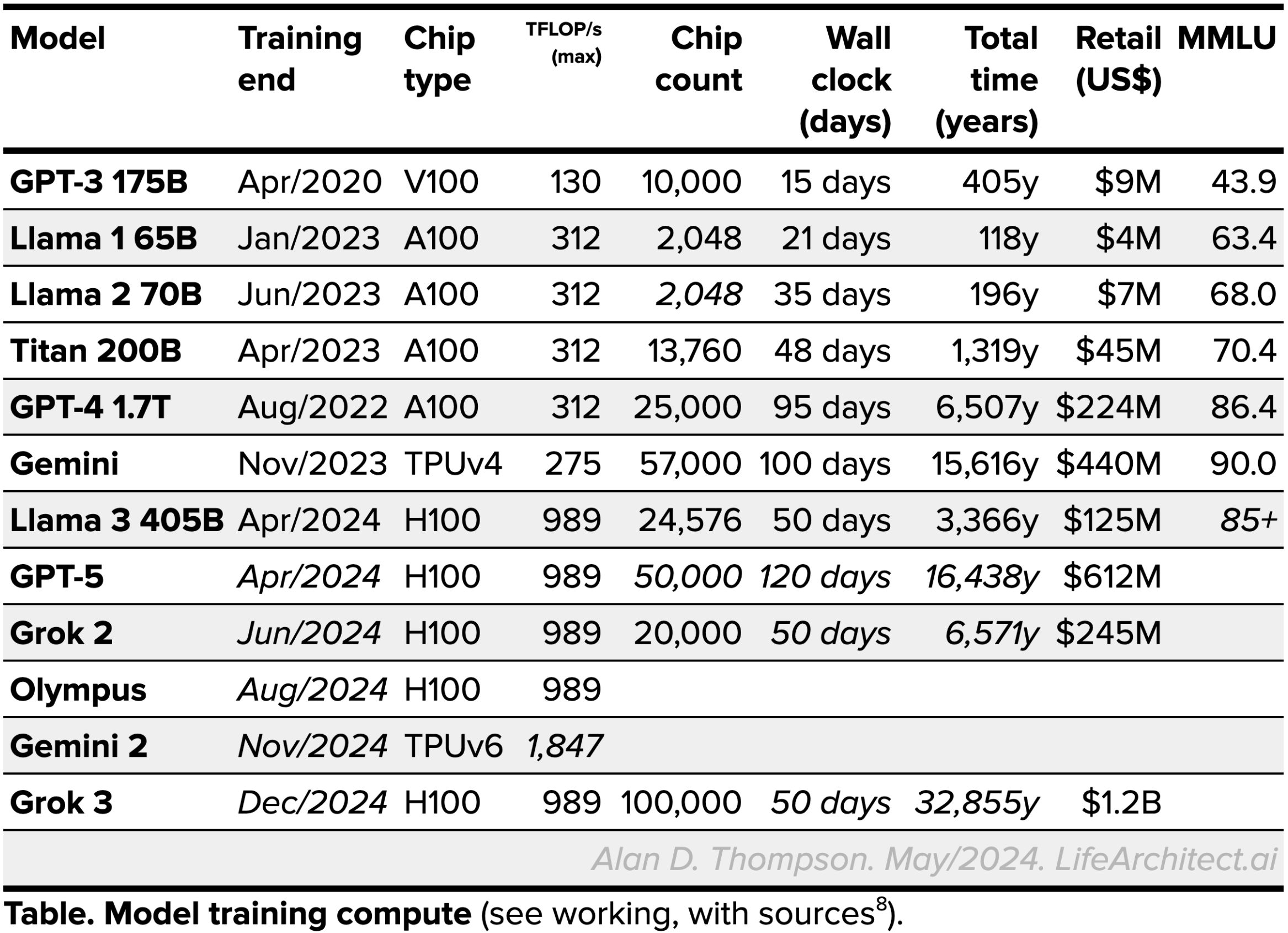 See working, with sources.
See working, with sources. |
| Announce date | |
| Release date (public) | |
| Paper | – |
| Playground | – |
Updates
Jul/2025: Stargate advances:
“Together with our Stargate I site in Abilene, Texas, this additional partnership with Oracle will bring us to over 5 gigawatts of Stargate AI data center capacity under development, which will run over 2 million chips… Oracle began delivering the first Nvidia GB200 racks last month [Jun/2025] and we recently began running early training and inference workloads, using this capacity to push the limits of OpenAI’s next-generation frontier research.” (OpenAI, 22/Jul/2025)
16/Apr/2025: o3 and o4-mini released.
23/Jan/2025: Brad Lightcap, OpenAI (Cisco AI Summit, 23/Jan/2025)
The great insight that Ilya had way back when is that the systems that didn’t seem to work at small scale weren’t fundamentally flawed, they just needed to be scaled up. And we’ve seen demonstrably now that when you scale GPT models, you get consistently better results. We think that continues. Now you have this entirely new vector of scaling, which is the o series of models. We’re very excited about that, and we don’t see any asymptote on scaling laws…
With scaling the big pre-trained transformers, you enter into a regime where you become data limited if you’re not already compute limited. And so in some sense, we hit a wall. It wasn’t a technical wall, it was just an environmental wall. So we could continue to scale those models. There’s no scientific reason why a GPT-5 or 6 couldn’t exist and have the same kind of return to scale that you see going from GPT-3 to GPT-4…
The beautiful thing about RL [reinforcement learning], though, and the way that we’ve built the reasoning models, is they take you on a different path. Someone on our research team described it to me the other day. o1 is almost like a portal to GPT-7 or GPT-8. It’s a way to leverage the knowledge in the pre-trained model, which is a GPT-4 scale model, in a way that basically gives you the effective compute of what a GPT-7 or GPT-8 would otherwise use, to achieve that same level of intelligence. It’s a pure discontinuity on the scaling…
I think we’ll continue to do both [GPT and o models]. I think we still see a lot of potential in pre-training levels, where you’ll see a 5 and a 6 and a 7 coming on that front as well. I think we’ll see where that all goes. Believe it or not, it’s actually almost more continuous than these discrete jumps now.
Major points
Model name
OpenAI (17/Oct/2024 timecode 21m11s, transcribed by Whisper):
We plan to continue developing and releasing models in the new OpenAI o1 series, as well as our GPT series. In addition to model updates, we expect to add web browsing, file and image uploading, and other features to [o1 to] make them more useful in use cases in ChatGPT. And while even today you are able to switch between models in the same conversation, like you saw in the demo, we’re working to enable ChatGPT to automatically choose the right model for your given prompt.
Smarts
The GPT-4x and o Model Family: Varied Intelligence Scores 2024–2025
 View interactive chart in new tab
View interactive chart in new tab
Scaling reinforcement learning (May/2025)
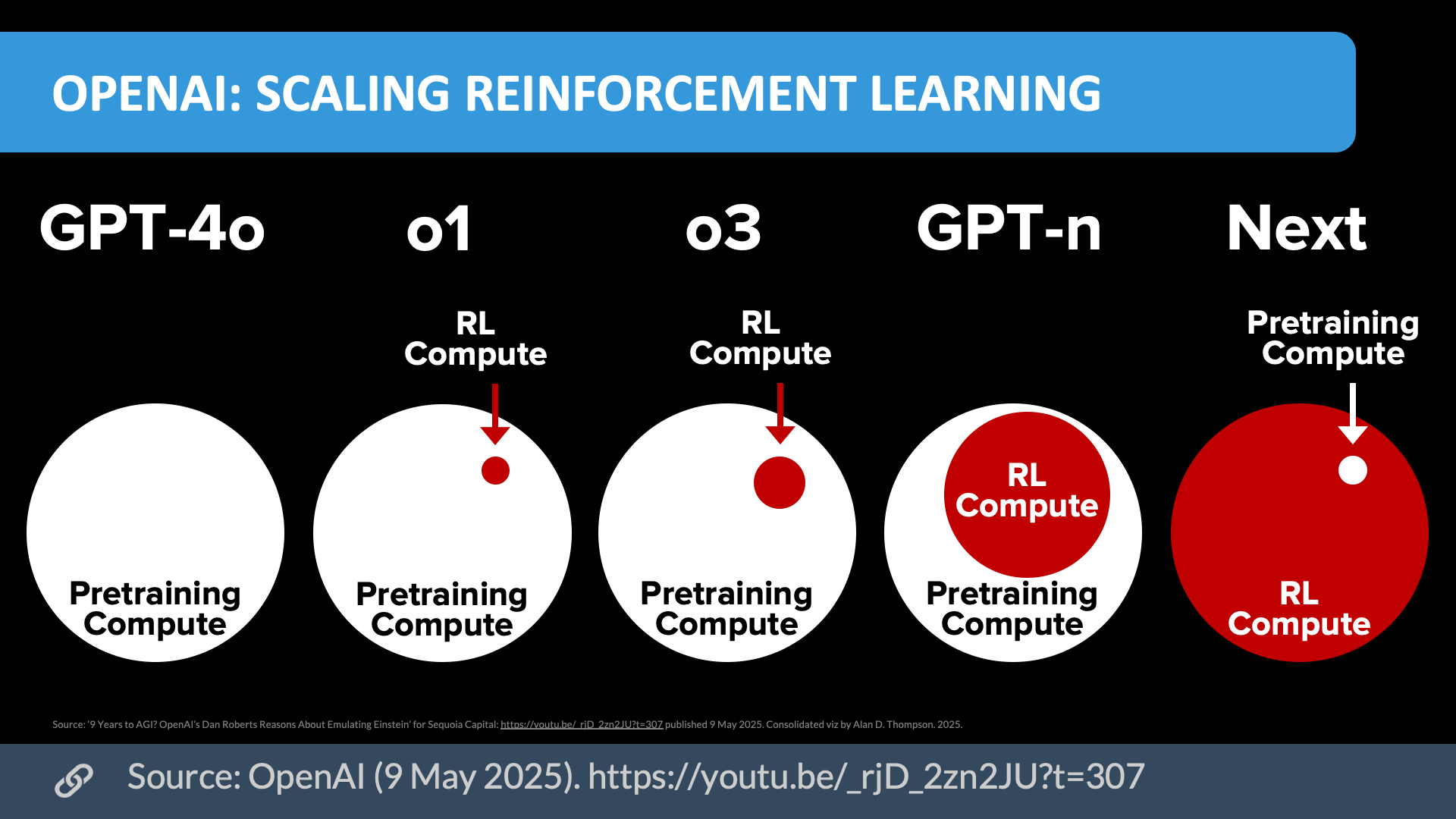 Download source (PDF)
Download source (PDF)Source: OpenAI (9/May/2025). Permissions: Yes, you can use these visualizations anywhere, cite them.
Reasoning model scores: o1, o3, o4
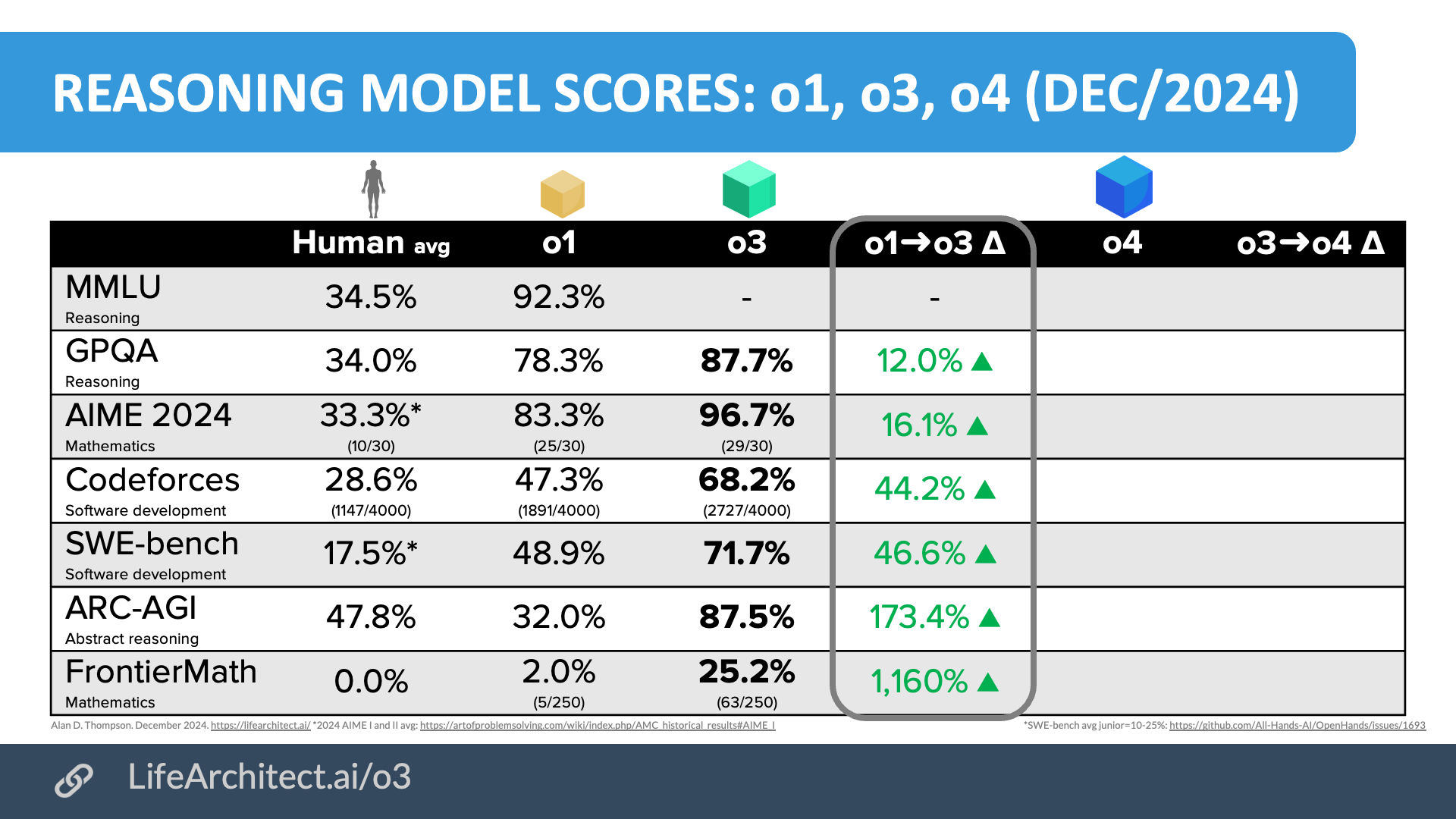
| Human avg | o1 | o3 | o1→o3 Δ | o4 | o3→o4 Δ | |
|---|---|---|---|---|---|---|
| MMLU Reasoning |
34.5%2Human average, not expert average |
92.3% |
- | - | ||
| GPQA Reasoning |
34.0%3PhD human average, but not PhD in subject field average |
78.3% |
87.7% |
12.0% ▲ |
||
| AIME 2024 Mathematics |
33.3%(10/30)4"2024 AIME I and II median score=5/15": artofproblemsolving.com, disregards that these humans are probably in the top 1% of mathematics performance: 'Qualification parameters for the AIME depend on the results of the AMC 10 and AMC 12 competitions. For the AMC 10, at least the top 2.5% of all scorers from the A and B competition dates are invited, and for the AMC 12, at least the top 5% of all scorers on each version are invited [to take the AIME test].maa.org |
83.3%(25/30) |
96.7%(29/30) |
16.1% ▲ |
||
| Codeforces Software development |
28.6%(1147/4000)5https://codeforces.com/blog/entry/126802 |
47.3%(1891/4000) |
68.2%(2727/4000) |
44.2% ▲ |
||
| SWE-bench Software development |
17.5%6Human expert average, that is junior developer estimate=10-25%: https://github.com/All-Hands-AI/OpenHands/issues/1693 |
48.9% |
71.7% |
46.6% ▲ |
||
| ARC-AGI Abstract reasoning |
47.8%7NYU: "Independent samples t-tests suggest that evaluation tasks are significantly harder for people than training tasks... We estimate that the average task accuracy after three attempts on the evaluation set is 64.2% (SD=22.8%, [55.9%, 68.9%]). In addition to this result, we report a first and second attempt average task accuracy of 47.8% (SD=23.2%, [41.6%, 54.6%] and 60.2% (SD=23.3%, [52.4%, 65.4%]) respectively." https://arxiv.org/pdf/2409.01374#page=6 |
32.0%8x.com |
87.5% |
173.4% ▲ |
||
| FrontierMath Mathematics |
0.0%(0/250)9Human average estimate (by Alan) |
2.0%(5/250) |
25.2%(63/250) |
1,160% ▲ |
Size estimate
…
Dataset
The o4 dataset is expected to use much of the initial GPT-3 dataset as detailed in my report What’s in my AI?, and to be very similar to the dataset used to train GPT-4 Classic 1.76T (available in lab Aug/2022), with some additional datasets from new synthetic data and partnerships as outlined in my GPT-5 dataset report.
 A Comprehensive Analysis of Datasets Likely Used to Train GPT-5
A Comprehensive Analysis of Datasets Likely Used to Train GPT-5
Alan D. Thompson
LifeArchitect.ai
August 2024
27 pages incl title page, references, appendices.
Use cases
Coming soon…
2026 frontier AI models + highlights
 Download source (PDF)
Download source (PDF)Permissions: Yes, you can use these visualizations anywhere, please leave the citation intact.
Older bubbles viz
 Download source (PDF)
Download source (PDF)Permissions: Yes, you can use these visualizations anywhere, please leave the citation intact.
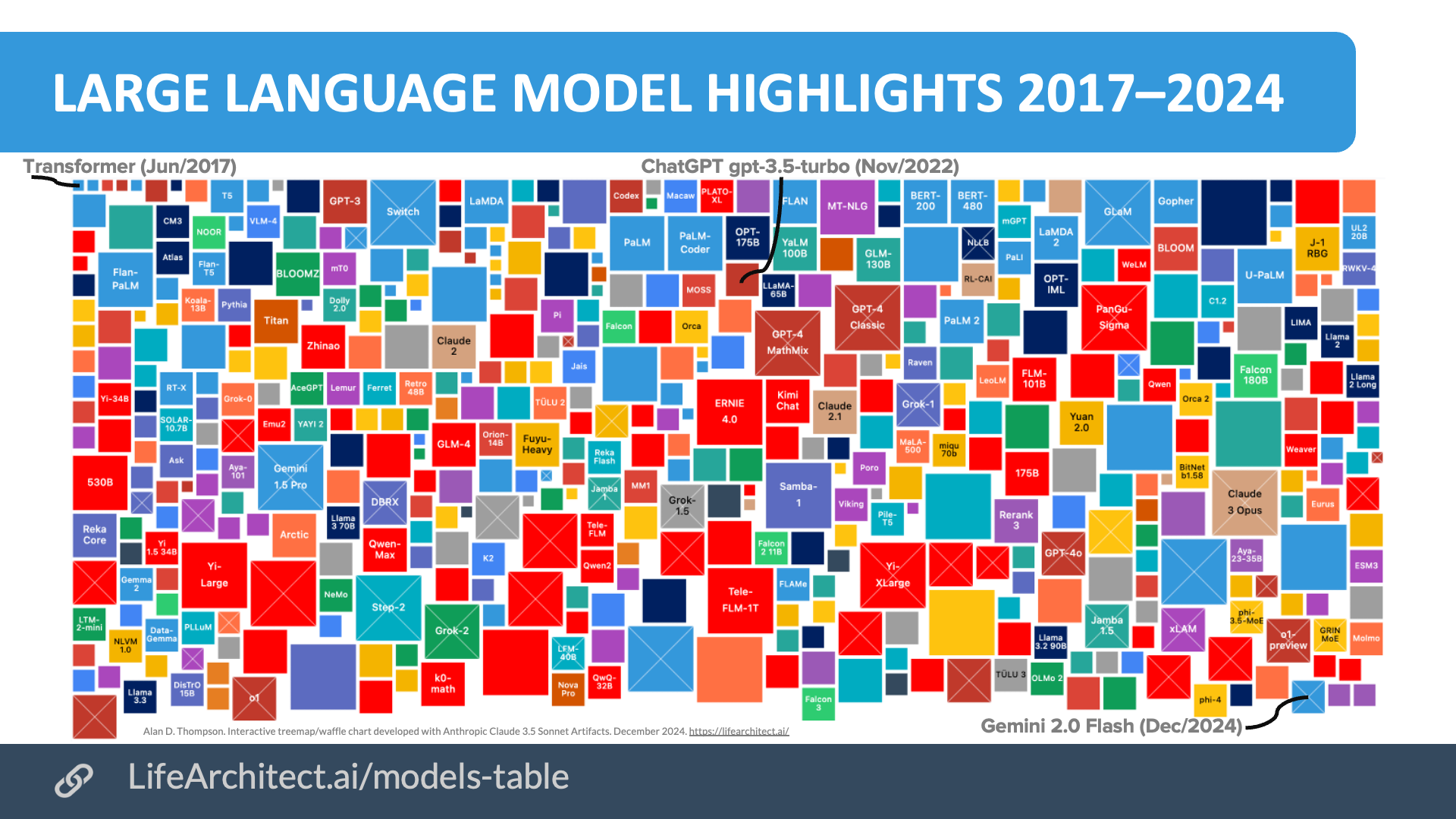 Download source (PDF)
Download source (PDF)Permissions: Yes, you can use these visualizations anywhere, please leave the citation intact.
Oct/2024
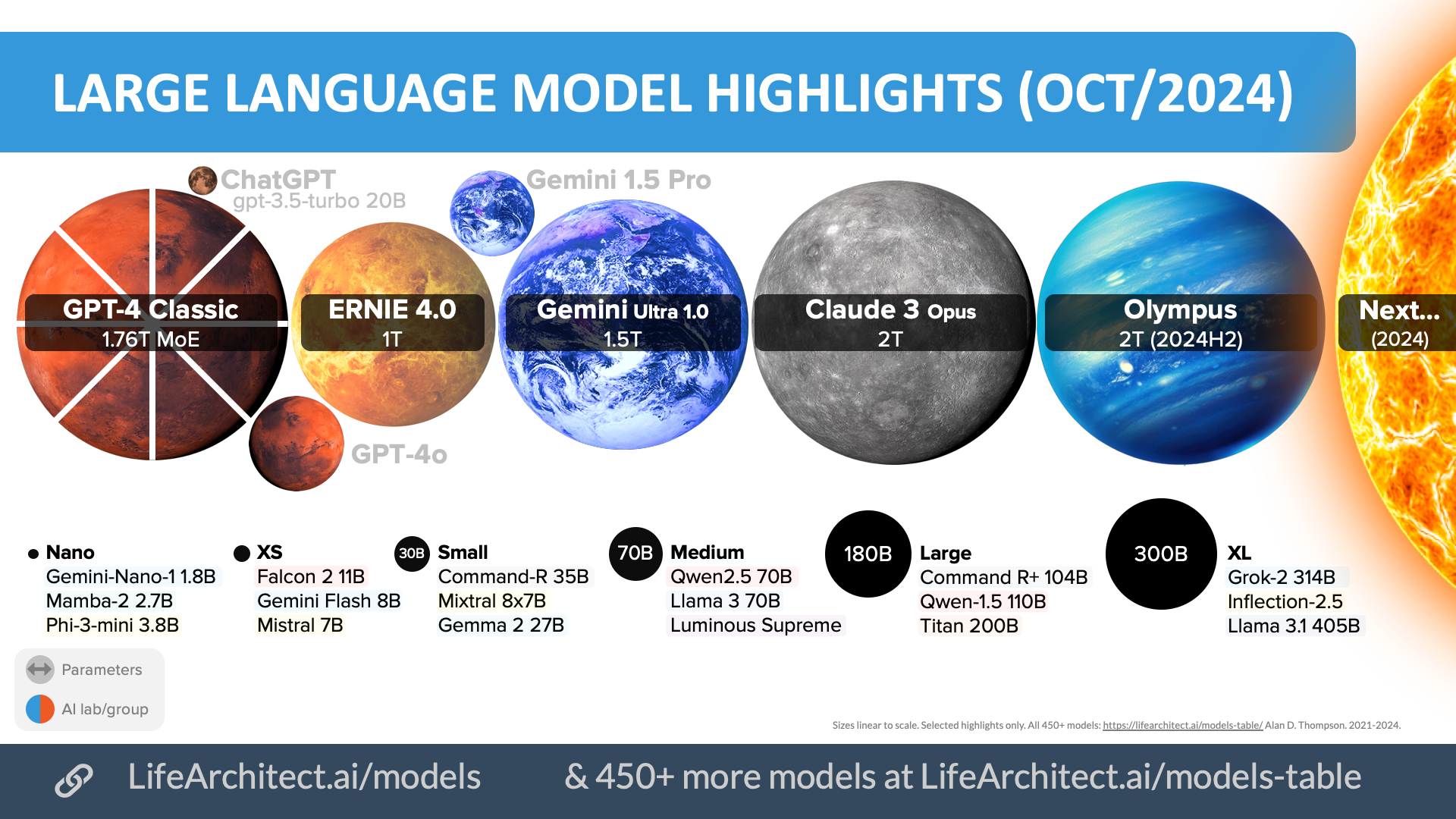 Download source (PDF)
Download source (PDF)Permissions: Yes, you can use these visualizations anywhere, please leave the citation intact.
Feb/2024
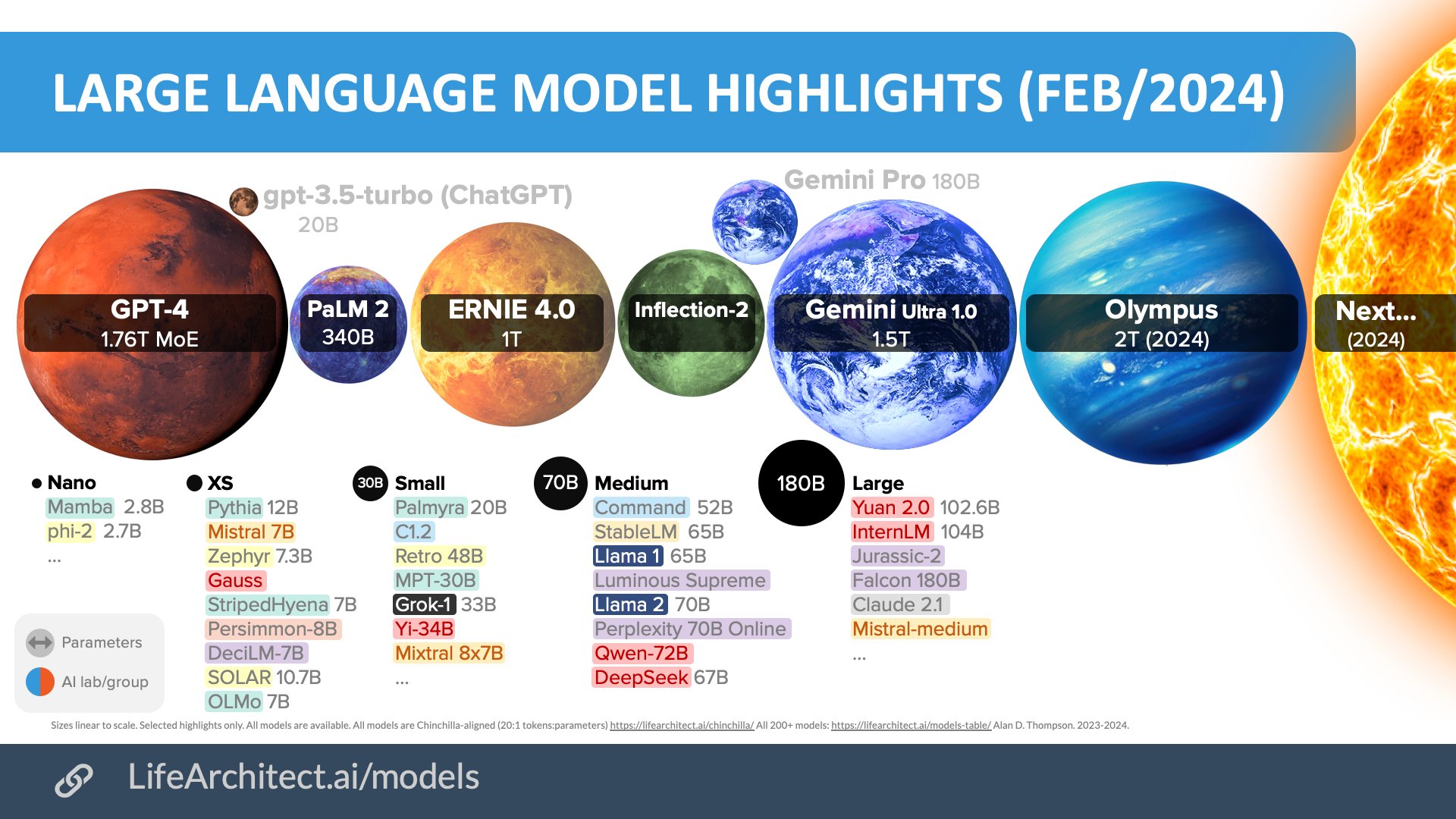
Nov/2023
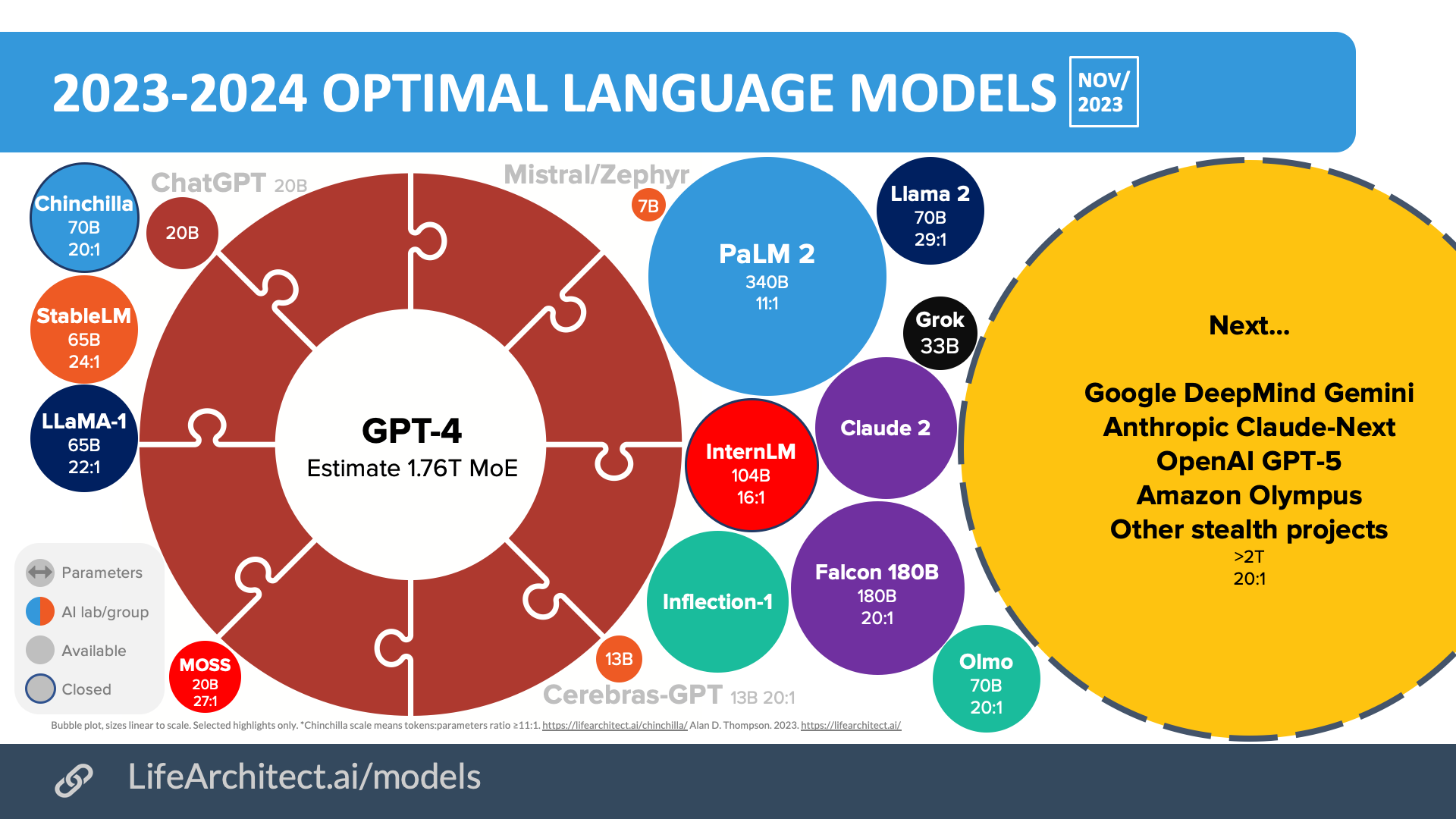 Download source (PDF)
Download source (PDF)Permissions: Yes, you can use these visualizations anywhere, please leave the citation intact.
Mar/2023
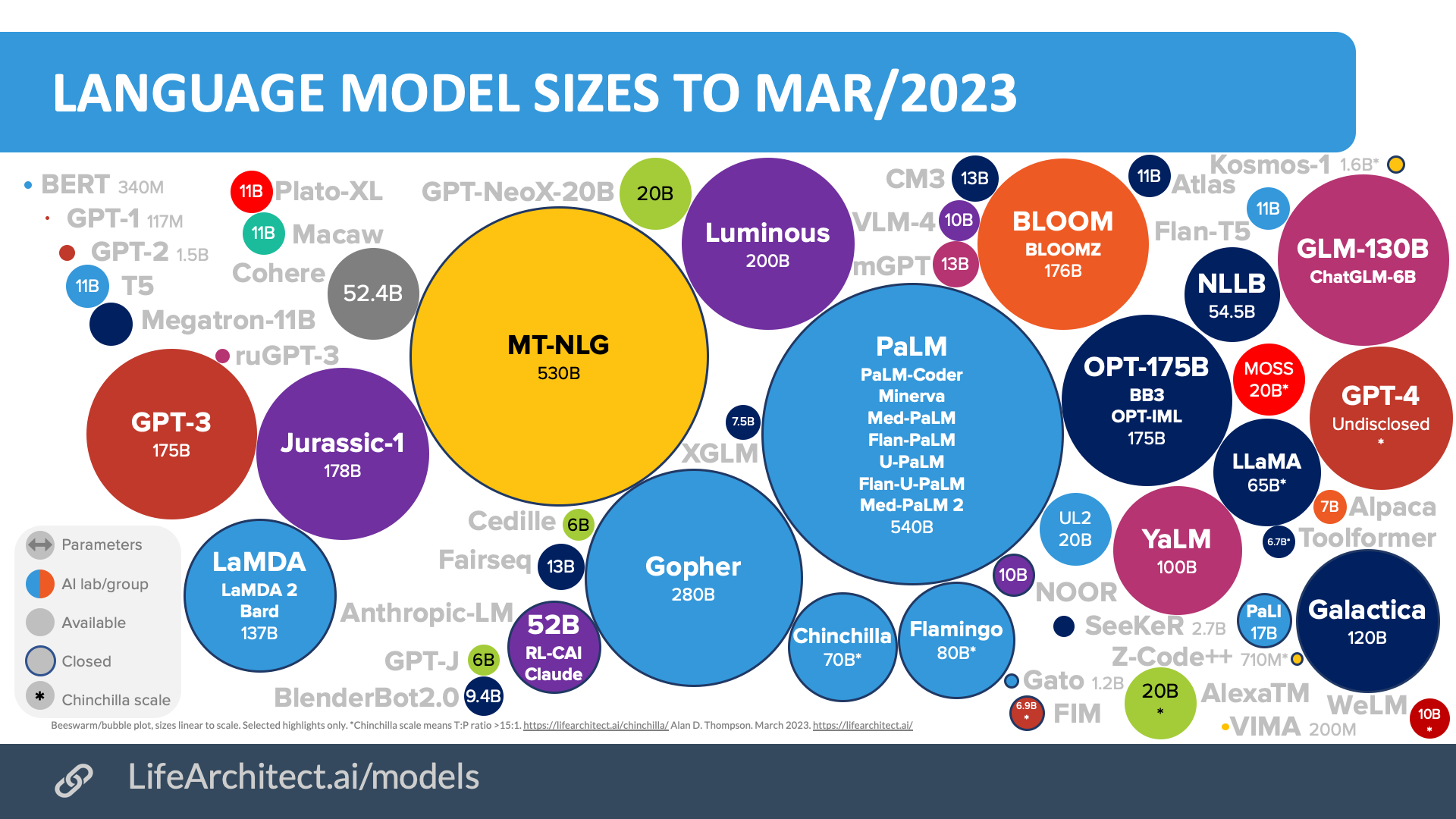 Download source (PDF)
Download source (PDF)
Apr/2022
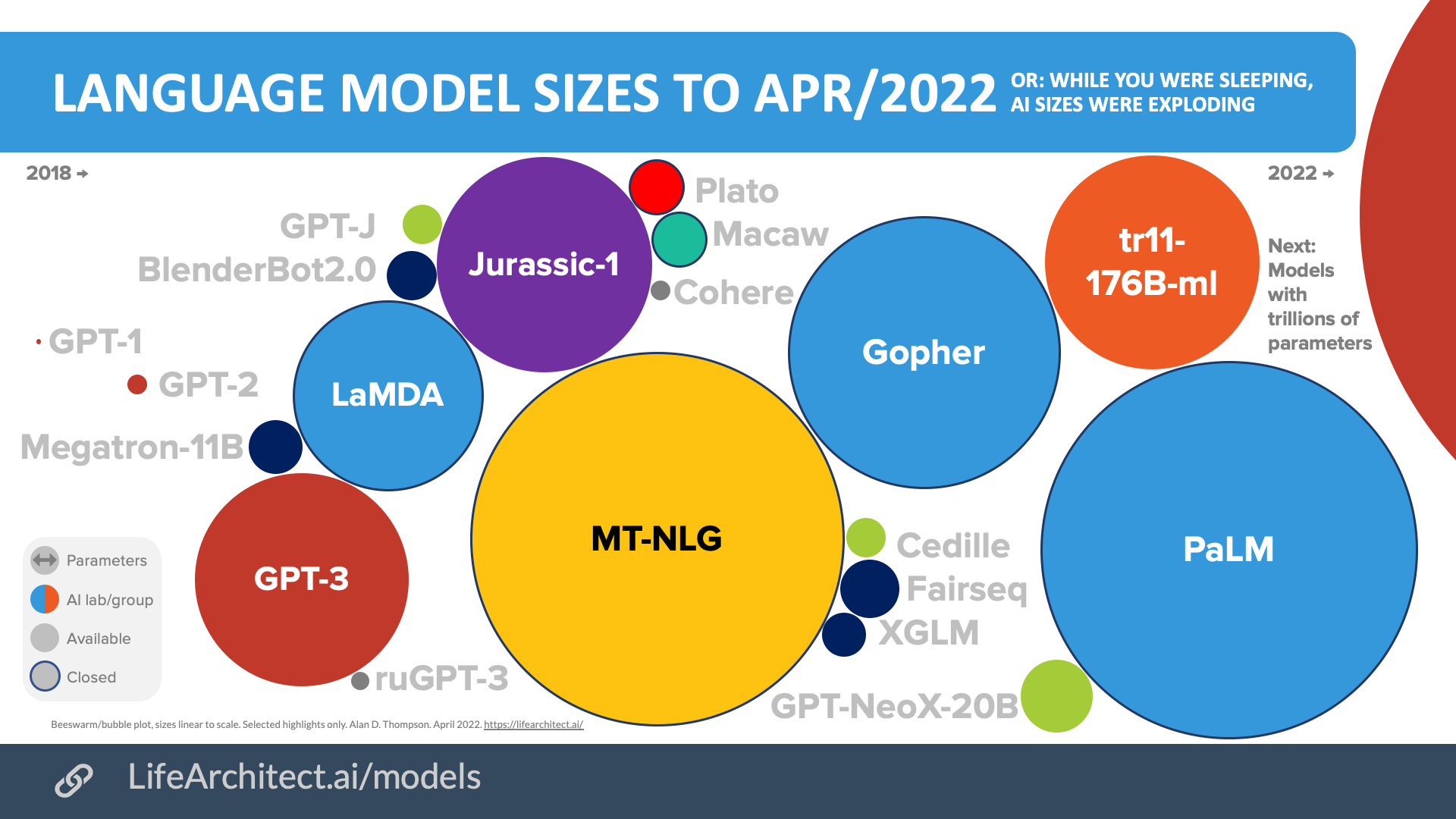 Download source (PDF)
Download source (PDF)
Models Table
Summary of current models: View the full data (Google sheets)Timeline to o4
| Date | Milestone |
| 11/Jun/2018 | GPT-1 announced on the OpenAI blog. |
| 14/Feb/2019 | GPT-2 announced on the OpenAI blog. |
| 28/May/2020 | GPT-3 preprint paper published to arXiv. |
| 11/Jun/2020 | GPT-3 API private beta. |
| 22/Sep/2020 | GPT-3 licensed exclusively to Microsoft. |
| 18/Nov/2021 | GPT-3 API opened to the public. |
| 27/Jan/2022 | InstructGPT released as text-davinci-002, later known as GPT-3.5. InstructGPT preprint paper Mar/2022. |
| 28/Jul/2022 | Exploring data-optimal models with FIM, paper on arXiv. |
| Aug/2022 | GPT-4 finished training, available in lab. |
| 1/Sep/2022 | GPT-3 model pricing cut by 66% for davinci model. |
| 21/Sep/2022 | Whisper (speech recognition) announced on the OpenAI blog. |
| 28/Nov/2022 | GPT-3.5 expanded to text-davinci-003, announced via email: 1. Higher quality writing. 2. Handles more complex instructions. 3. Better at longer form content generation. |
| 30/Nov/2022 | ChatGPT announced on the OpenAI blog. |
| 14/Mar/2023 | GPT-4 released. |
| 31/May/2023 | GPT-4 MathMix and step by step, paper on arXiv. |
| 6/Jul/2023 | GPT-4 available via API. |
| 25/Sep/2023 | GPT-4V released. |
| 13/May/2024 | GPT-4o announced. |
| 18/Jul/2024 | GPT-4o mini announced. |
| 12/Sep/2024 | o1 released. |
| 20/Dec/2024 | o3 announced. |
| 27/Feb/2025 | GPT-4.5 released. |
| 14/Apr/2025 | GPT-4.1 released. |
| 16/Apr/2025 | o3 released. |
| 16/Apr/2025 | o4-mini released. |
| 5/Aug/2025 | gpt-oss-120b and gpt-oss-20b released. |
| 7/Aug/2025 | GPT-5 released. |
| 12/Nov/2025 | GPT-5.1 released. |
| 11/Dec/2025 | GPT-5.2 released. |
| 2026 | GPT-6 due… |
| 2026 | GPT-7 due… |
Videos
…
Get The Memo
by Dr Alan D. Thompson · Be inside the lightning-fast AI revolution.Informs research at Apple, Google, Microsoft · Bestseller in 147 countries.
Artificial intelligence that matters, as it happens, in plain English.
Get The Memo.
 Alan D. Thompson is a world expert in artificial intelligence, advising everyone from Apple to the US Government on integrated AI. Throughout Mensa International’s history, both Isaac Asimov and Alan held leadership roles, each exploring the frontier between human and artificial minds. His landmark analysis of post-2020 AI—from his widely-cited Models Table to his regular intelligence briefing The Memo—has shaped how governments and Fortune 500s approach artificial intelligence. With popular tools like the Declaration on AI Consciousness, and the ASI checklist, Alan continues to illuminate humanity’s AI evolution. Technical highlights.
Alan D. Thompson is a world expert in artificial intelligence, advising everyone from Apple to the US Government on integrated AI. Throughout Mensa International’s history, both Isaac Asimov and Alan held leadership roles, each exploring the frontier between human and artificial minds. His landmark analysis of post-2020 AI—from his widely-cited Models Table to his regular intelligence briefing The Memo—has shaped how governments and Fortune 500s approach artificial intelligence. With popular tools like the Declaration on AI Consciousness, and the ASI checklist, Alan continues to illuminate humanity’s AI evolution. Technical highlights.This page last updated: 22/Jul/2025. https://lifearchitect.ai/o4/↑
- 1Image generated in a few seconds, on 22 December 2024, via Imagen 3-002, text prompt by Alan D. Thompson, ‘a zoomed out background header of tetraoxide, with lowercase title ‘o4’.’
- 2Human average, not expert average
- 3PhD human average, but not PhD in subject field average
- 4"2024 AIME I and II median score=5/15": artofproblemsolving.com, disregards that these humans are probably in the top 1% of mathematics performance: 'Qualification parameters for the AIME depend on the results of the AMC 10 and AMC 12 competitions. For the AMC 10, at least the top 2.5% of all scorers from the A and B competition dates are invited, and for the AMC 12, at least the top 5% of all scorers on each version are invited [to take the AIME test].maa.org
- 5
- 6Human expert average, that is junior developer estimate=10-25%: https://github.com/All-Hands-AI/OpenHands/issues/1693
- 7NYU: "Independent samples t-tests suggest that evaluation tasks are significantly harder for people than training tasks... We estimate that the average task accuracy after three attempts on the evaluation set is 64.2% (SD=22.8%, [55.9%, 68.9%]). In addition to this result, we report a first and second attempt average task accuracy of 47.8% (SD=23.2%, [41.6%, 54.6%] and 60.2% (SD=23.3%, [52.4%, 65.4%]) respectively." https://arxiv.org/pdf/2409.01374#page=6
- 8
- 9Human average estimate (by Alan)
